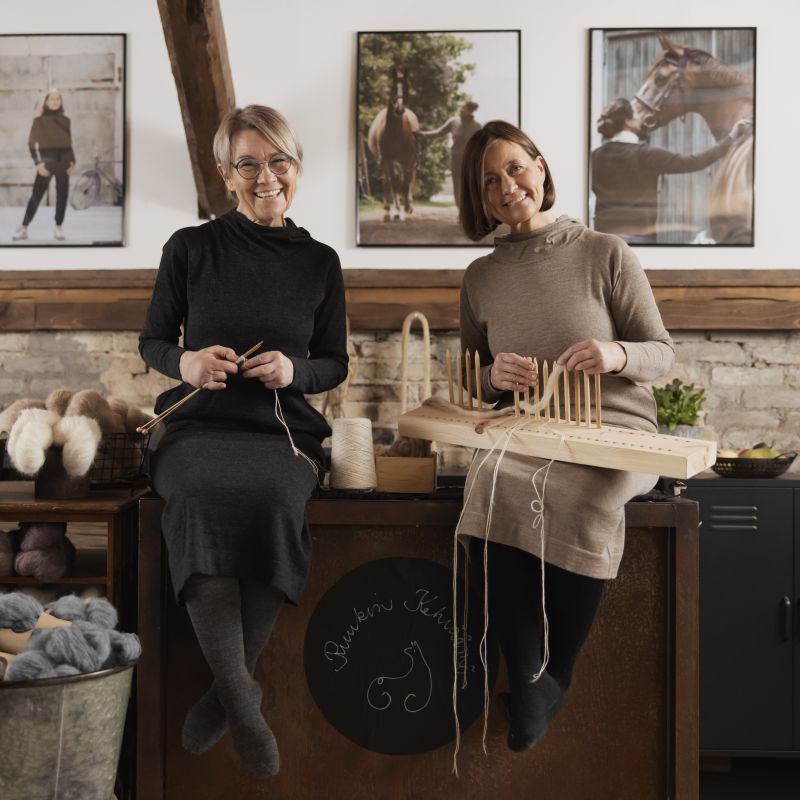Sustainability Report 2025 (Infine Oy)
Transparent sustainability in the Alpaca Royal collection
Country of origin of materials: Peru
Country of manufacture: Finland, Lithuania
Certifications across the value chain: Responsible Alpaca Standard, Fair Trade, USDA Organic
The alpaca products from Ruukin Kehräämö are natural, undyed, and are not treated with chemicals. The products are designed and manufactured in Finland—some as in-house production, some by domestic partners, and some in Lithuania, because for technical reasons they cannot be produced in Finland. Design aims to ensure the garments have the longest possible lifespan. They are designed to be timeless, versatile and stylish, and to withstand long-term wear.
Ruukin spinning mill, together with sustainability technology company Infinen, carried out a comprehensive sustainability analysis for its Alpaca Royal collection, with the aim of shedding light on the product's entire value chain. The result is an overall picture of the sustainability of alpaca products. We compiled ten sustainability factors from the Alpaca Royal value chain. By shedding light on the value chain, it also serves as an example of sustainability for the apparel industry.
We first highlight the factors that raise the sustainability of Alpaca Royal products above that of their peers. Then we go through the risks at the core of the sustainability work. However, transparency is an important factor in Alpaca Royal's production so that nothing remains unclear to the consumer.
1. Responsible sourcing of materials
The collection's alpaca wool is durable, undyed and not treated with chemicals. The wool comes from Peru, and its supply chain follows the Responsible Alpaca standard. This guarantees animal welfare as well as ethical and sustainable production methods. Alpaca wool is naturally recyclable and reusable.
2. Minimizing waste
Ruukin Kehräämö takes in products at the end of their lifecycle and processes them into new material. This approach reduces waste and the consumption of non-renewable natural resources. The products are also knitted into shape, resulting in no waste.
3. Maintenance service and lifetime warranty
Repairing the product and extending its lifespan has been made easy with our own maintenance service. Extending the product's lifespan keeps the resources used in its manufacture in circulation longer, reducing the need to use new resources. Products have a lifetime warranty.
Sustainability risks associated with Alpaca Royal products.
Even if a product has third-party certifications, the country of origin also has its own risks that can be minimized by certifications but cannot be completely eliminated. Therefore, being aware of these risks is part of being responsible.
1. Corruption and the human rights situation in the country of origin
Alpaca wool comes from Peru, on the other side of the world. When operating in Peru, particular attention must be paid to the human rights situation and to other potential risks, such as corruption. For example, the Corruption Perceptions Index, which measures the level of corruption in different countries, assesses the corruption risk in Peru as significant.
Third-party certifications and audits can improve the situation. Alpaca Royal products carry the Responsible Alpaca certification, which guarantees breeders good conditions for their livelihood and for raising alpacas. In this way the producer supports the practice of raising alpacas as a livelihood for indigenous peoples.
2. Optimization of water use in the country of origin.
Access to clean, fresh water is a global sustainability issue, and in the alpaca's country of origin, Peru, clean freshwater is scarce. Alpaca fleece always involves some water use, and optimizing water use, proper treatment, and recycling increase the prospects for continued operations.
At the same time, alpaca wool reduces water use, since alpaca wool is not dyed at any stage. All colors come from the alpacas' natural hues, which significantly reduces water consumption.
Carrying out the sustainability assessment
The sustainability assessment for Ruukin Kehräämö was carried out by: InfineInsight. The independent sustainability panel consists of leading experts who ensure the reliability of Infine Insight's data collection and rules.
The use of a third party in a sustainability assessment means that an independent third party sets the targets and monitors their implementation. This ensures that, in addition to the producer's own oversight, the third party supervises operations and acts as a kind of verifier that the value chain's activities comply with the requirements.


